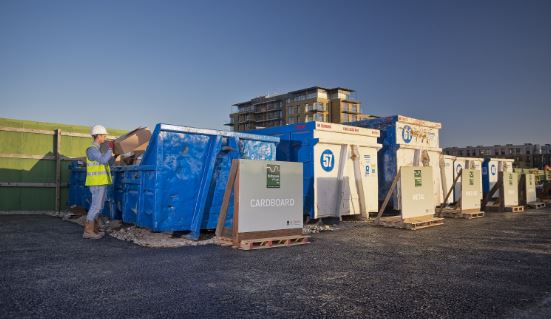Waste Management in Construction (2012)
This dissertation aims to report the exploration of the problem of waste management on construction sites with more emphasis laid down in the United Kingdom. The study unveils the innate dangers that the material waste poses to the established construction Industry. Materials are extremely significant in the construction industries, particularly on the building sites, but the issue lies in the fact that not all the delivered material that has been ordered is used for the construction purposes.
The consequent desertion of the material left then becomes a part of waste. The extent of material wastage is discussed with minute details after thorough research from the internet and certain books. The measures of reducing the construction wastage is also extensively laid down and explained in the other part of the dissertation. With the implementation of measures, there come certain barriers that obstruct the smooth going path of material reduction.
These barriers are discussed in the next section. The chief research instruments that were used for this project included the secondary sources like books and website sources. The research revealed that material wastage result in an additional cost to any ongoing construction project and in turn reduces the contractor’s profit. The consideration of the transportation and storage cost of the material wastage is undertaken while evaluating the financial profits and losses.
Non- reclamation of waste also leads to a bare loss of revenue of the contractor. Therefore, the issues of lack of knowledge and poor management are discussed in the dissertation. The dissertation, to end with, recommends that the reusing and recycling of the material wastage in construction sites is a feasible option in construction waste management”. It also recommends that the material wastage can be abridged by providing certain incentives to the workmen for a better material handling.
- 12,000 words – 60 pages in length
- Excellent use of literature
- Good analysis of the subject area
- Well written throughout
- Ideal for building studies and construction students
1. Introduction
Aims/Objectives
Description of the Research Methodology
2. Extent of Material Wastage In the UK Construction Industry
Necessity of Waste Management In Construction Industry
Imports of Material Wastage In Construction Processes
Average Amount And Nature of Waste Materials Generated
Resources Facilitating Effective Waste Management
Primary Sources And Origins of Material Wastes
Construction Processes Emitting Maximum Amount of Waste
3. Mechanisms for Reducing Material Wastage for the Construction Industry
Various Types of Construction Waste
Measures To Reduce Construction Waste
Why Dispose Construction Waste Effectively
Waste Constitution
How To Improve Resource Efficiency?
Anarchy And Lack of Organization In Construction Management
Methods To Improve Resource Efficiency
Level of Realization Among Construction Companies
Suitability of Mechanisms Being Employed
Outsource the Cleaning Services
4. Realisation of Financial Savings
Why Waste Management
Steps To Get It Started
Benefit Analysis of Waste Management
Cost Benefit
Credit Benefits
Environmental Benefits
5. Barriers in Implementing Various Mechanisms
Barriers In Implementing A Successful Waste Management Mechanism
Barriers In Reducing Waste To Landfills
Recycling
Waste Minimisation
Steps Before Designing
Study of Site
Take a future view of the building
Keep the project team in loop
Research
Causes of Wastage During Designing
Complexity of Material and components
Complexity of building
Co-ordination
To track fast
Communication
6. Statement of Results / Data Analysis
7. Discussions
8. Summary and Conclusions
Summary
Conclusion
Recommendations
References

